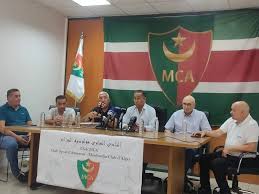The CSA/MC Algiers multi-sport club continues to spiral into chaos following what has been described as a “coup d’état” within the organisation in January 2024, allegedly carried out by a group of individuals backed by Algeria’s sports administration.
The club’s internal turmoil, which began under former Sports Minister Abderrahmane Hammad—now president of the Algerian Olympic Committee—has shown no sign of abating under the current minister, Walid Sadi.
At the heart of the controversy are persistent allegations of procedural violations and mismanagement.
The latest flashpoint occurred during an Extraordinary General Assembly (AGEX) convened by the self-declared president of the CSA, Mohamed Khaldi, on 20 and 21 May.
Intended to elect heads of the various sports sections and section representatives, the assembly fell short of the required quorum on its first day and reconvened the following day with only eight participants—far below the legally required number for such a meeting.
Compounding the controversy, several legitimate members of the General Assembly were reportedly barred from entering the venue.
Among them was Brahim Boudiaf, who was denied access without written justification.
Khaldi is said to have labelled him a disruptive presence, raising further concerns over a disregard for democratic debate and established association rules.
Tensions also flared during the proceedings when Khaldi attempted to introduce an alternative list of candidates not drawn from the recognised 32-member structure of the CSA/MCA.
Some of these new candidates, not yet members of the General Assembly, were reportedly pressured into paying membership dues on the spot—an act critics say contravenes regulations governing such elections.
The backdrop to these developments includes a halted executive renewal process and the controversial establishment of a temporary directorial committee on 1 February 2024 by the then-minister Hammad.
This was followed by the removal of at least 80 members from the original, legally recognised General Assembly and the contentious election of Khaldi, all while the club continues to operate without official accreditation.
Further fuelling discontent is the recent appointment of a group of so-called “grand electors” that includes key figures such as Tahar Belkhiri, Amar Brahmia, and Mohamed Iadene—decisions that have only deepened suspicions of internal manipulation.
One notable incident involved the ousting of Réda Benagoudjil from the basketball section, replaced by the son of Amar Brahmia, whose entry into the General Assembly had reportedly been facilitated through questionable means.
Veteran members of the CSA/MCA General Assembly, many of whom have experienced previous periods of crisis, are now voicing hope for eventual reform.
They believe the current path of legal breaches and internal power plays cannot continue indefinitely and that a return to lawful governance is not just necessary—but inevitable.












